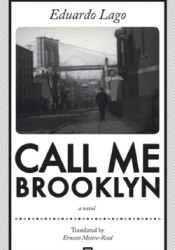Call Me Brooklyn
by Eduardo Lago, translated by Ernesto Mestre-Reed
reviewed by Gabriel García Ochoa
In 2006, the year it was originally published in Spanish, Call Me Brooklyn (Llámame Brooklyn) won two important literary prizes: the coveted Premio Nadal, Spain’s oldest literary prize, and the Premio de la Crítica de narrativa castellana, awarded to titans like Mario Vargas Llosa. The acclaim that Lago’s book received was matched by a certain surprise at the winner: until then, Lago was virtually unknown in the world of Spanish literature. Call Me Brooklyn is his first novel, and it is an absolute masterpiece.
Born in Madrid, Lago immigrated to New York in 1987, when he was thirty-three years old. He received a PhD in Literature from NYU and started teaching Spanish and Spanish literature at Sarah Lawrence shortly thereafter. Prior to Call Me Brooklyn, he had published a collection of short stories, Cuentos dispersos (Scattered Tales), and Cuaderno de México (Mexican Notebook), a travel memoir. His analysis of three Spanish translations of James Joyce’s Ulysses won the Premio de Crítica Literario Bartolomé March in 2001. But aside from these somewhat modest achievements, a handful of Spanish translations of works by prominent authors in English (Junot Diaz’s Drown, for example), and some articles written for the Spanish newspaper El País, Lago was not widely known.
It is hard to believe that Call Me Brooklyn is anyone’s first novel. The book is an incredibly mature work, at once deep, challenging, and playful. I read Lago’s novel in Spanish a few years ago and reread it recently before picking up Ernesto Mestre-Reed’s exceptional translation, published only last year. Mestre-Reed is the recipient of a Guggenheim Fellowship and the author of a handful of novels; like Lago, he teaches at Sarah Lawrence.
The most striking feature of Call Me Brooklyn is its structure. The book begins with the death of its main character, Gal Ackerman. After almost forty years of attempting to write his novel, Gal has left it unfinished. Now it is up to his friend Néstor Olivera-Chapman, a journalist, to reconstruct, or rather, give form to Gal’s novel out of the myriad fragments he has left behind. Newspaper clippings, diary entries, short stories, and incomplete drafts; as Néstor takes us through the paraphernalia of Gal’s archive, reading Call Me Brooklyn feels like reading a letter that has been half-burnt and pieced back together from the ashes. The novel is far from linear, and part of Lago’s talent lies in his ability to bring the reader along on the many twists and turns of the maze he has built. As Néstor starts to string the pieces of his friend’s fragmentary history into a narrative, both Gal’s novel and the story of his life start to take shape.
Gal inherited his passion for Brooklyn from his grandfather David, an amateur journalist who used to write a weekly column about the borough. Shortly after turning fourteen, Gal learns that the couple who raised him are not his real parents. Gal’s mother was a Spaniard who fought during the Civil War and died after giving birth to him. In the absence of his biological father, an Italian brigadier, Gal’s adoptive father claimed him as his own and brought him back to America. Years later, as an adult living in New York, Gal comes across the love of his life: Nadia Orlov, a Russian-American violinist studying at Julliard. He becomes obsessed with her and they start a passionate, inspirational, and toxic relationship. As the story unravels, we are introduced to a crowd of secondary characters, all of them meticulously crafted miniatures who emerge through Néstor’s account of the different items in Gal’s archive: the successful painter Louise Lamarque, a decrepit chain-smoker living in her beautiful brownstone in Chelsea; Frank Otero, owner of the bar where the Brooklynite community of Americaniards meets; Mr. Tuttle, an avid consumer of cannoli, who counts his birthdays backwards. Even Lago’s version of Thomas Pynchon gets a cameo.
Lago is a renowned devotee of James Joyce. In 2008, two years after the publication of Call Me Brooklyn, he and the author Enrique Vila-Matas founded the eccentric “Order of Finnegans,” a society dedicated to the worship of Joyce’s Ulysses. Unlike Finnegan’s Wake, Call Me Brooklyn is not impenetrable, and it is infinitely more accessible than Ulysses. But there is a sense of Joycean bleakness throughout the book, mixed with Lago’s literary mischief and black humor. Since Call Me Brooklyn, Lago has written two more novels: Ladrón de mapas (Map Thief), and Siempre supe que volvería a verte, Aurora Lee, (I Always Knew I Would See You Again, Aurora Lee), which are currently available only in Spanish.
Published on February 25, 2015

